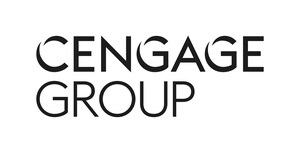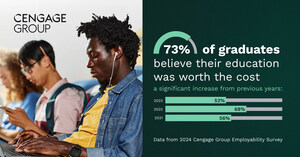- Half (49 percent) of recent graduates did not apply to entry-level jobs because they felt underqualified
- Non-degree graduates (49 percent) are more confident than degree graduates (41 percent) that their education signaled "readiness" to employers
- Only 25 percent of recent graduates would pursue the same education path
BOSTON, June 7, 2022 /PRNewswire/ -- As American businesses vie for talent in one of the hottest jobs markets, half of all recent graduates have not applied to entry-level positions because they felt underqualified and unsure of their skills.
According to Cengage Group's 2022 Graduate Employability Report – the second annual report of 1,000 graduates who completed a degree or non-degree program in the last 12 months – this confusion and lack of confidence is causing today's graduates to question the value of their education and overall career readiness.
With the average graduate taking on $37,000 in debt1, many are experiencing "buyer's remorse" and just 25 percent say they would follow the same education path. Even more concerning is graduates' regret in choosing their field of study, with more than half of all graduates (55 percent) saying they had second thoughts about the program they were studying, but felt it was too late to switch courses. Instead, 41 percent of graduates say they would focus on getting a credential in a more "in-demand field."
"Various economic circumstances – inflation spiking, job opportunities and resignations flourishing, and a potential recession looming – are pushing many graduates to question their education and career choices. On top of that, a growing focus on skills-based hiring juxtaposed with the stigma of non-degree programs are leaving graduates confused about what education pathways provide a good return on investment and best prepare them for the workforce," said Michael E. Hansen, CEO of Cengage Group.
With 67 percent of graduates reporting that the jobs they applied to required a degree, employers continue to stigmatize and penalize graduates with non-traditional education backgrounds. However, today's graduates disagree with this notion and are slightly more likely to say skills certification or training credentials (35 percent) versus a traditional college degree (32 percent) more clearly indicates job readiness and skill level. In fact, when it comes to job qualification, the majority of graduates (61 percent; up from 58 percent in 2021) believe that employers should stop requiring two- or four-year degrees for many jobs/positions.
"Employers today desperately need workers who possess the skills needed to perform specialized, modern day work, and we're seeing many workers pursue shorter-term online training courses that allow them to acquire these skills more quickly and affordably. With many graduates now pursuing non-traditional education paths, this is a huge talent opportunity for employers and we encourage businesses to re-think hiring procedures and remove the stigmas associated with non-traditional degrees."
Other findings include:
- Job Descriptions Create Confusion and Kill Confidence. Graduates are confused about how to weigh their skills and credentials against job descriptions. Nearly two in five graduates (39 percent) felt underqualified for roles because they had some but not all of the skills listed in the job description.
- Traditional Degrees Don't Indicate Job Readiness. Graduates are skeptical about their career "readiness," with degree graduates (41 percent) less likely than non-degree graduates (49 percent) to say their education is a good indication of the skills they have.
- Beyond Student Debt, There is Regret. Faced with the stigma of forgoing a "traditional" degree, many of today's traditional degree graduates pursued an education they regret (55 percent) for a job they don't feel qualified to work in (53 percent). Education regret (46 percent) and feeling underqualified (49 percent) is slightly lower for non-degree graduates.
- Employers Can (and Should Be Motivated to) Redefine Career Readiness. Employers have an opportunity to remove stigmas associated with skills-based learning and broaden their talent pool by not only rethinking degree requirements, but also upskilling employees. Graduates are open to and interested in workforce training, with 95 percent saying they would pursue online training and credential programs if their employer covered the cost.
For more information on the Graduate Employability Report, click here. To learn more about workforce training and career development, visit Cengage Group at www.cengagegroup.com.
Cengage Group's Graduate Employability Report was conducted in May 2022 and polled 1,000 Americans 18+ who graduated / completed their education program in the past 12 months and are currently employed/not employed and those who expect to graduate / complete their education program and are employed/not employed. This survey was conducted direct-to-consumer via mobile devices. For the purposes of this survey, "skills training," "skills training program" or "skills training credential" refers to any credential that is recognized by an independent industry association, including but not limited to licensure such as in the skilled building trades, CompTIA certification, pharmacy tech certification, certified information security professional, etc.).
Cengage Group, a global education technology company serving millions of learners, provides affordable, quality digital products and services that equip students with the skills and competencies needed to be job ready. For more than 100 years, we have enabled the power and joy of learning with trusted, engaging content, and now, integrated digital platforms. We serve the higher education, workforce skills, secondary education, English language teaching and research markets worldwide. Through our scalable technology, including MindTap and Cengage Unlimited, we support all learners who seek to improve their lives and achieve their dreams through education. Visit us at www.cengagegroup.com or find us on LinkedIn or Twitter.
1 Student Loan Planner, April 2022, https://www.studentloanplanner.com/student-loan-debt-statistics-average-student-loan-debt/
CONTACT: [email protected]
SOURCE Cengage Group

WANT YOUR COMPANY'S NEWS FEATURED ON PRNEWSWIRE.COM?
Newsrooms &
Influencers
Digital Media
Outlets
Journalists
Opted In





Share this article